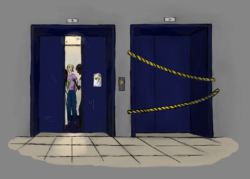Our education shapes us. What we learn and how we learn determines who we are and how we think. And while books, newspapers, and the internet are important sources of learning, some of our most powerful academic influences are our professors. They cultivate our creativity and inspire us to think for ourselves. When we take a class at Georgetown, we don’t determine the value of the education we are receiving based off of whether our professors are part-time or tenured, but by what we learn and how well we learn it. Good professors aren’t determined by their status within the University. Good professors are those who are able to challenge us and make us think. My favorite professors have been people that have taught classes where, at the end, I am a better person and a better student.
Some of my professors have taught me how we have a responsibility to respect and value the dignity of labor. But we often don’t think about how our professors are workers too. In addition to actually spending time with us in lectures, they spend countless hours preparing for classes, holding office hours, and grading papers and other assignments. They have families at home whom they have to support and provide for and often have large student debt loads from their years of study in order to earn PhDs and other advanced degrees. But much like grade school teachers, many University professors are greatly underappreciated. Somehow, as a society, we stress the value of education but cannot appropriately value the labor that provides education.
In the 1970s, part-time faculty made up about a fifth of all faculty at American colleges and universities. Currently, it’s about half and is still increasing. Part-time faculty earn just a fraction of what full-time faculty members make per class taught. They must cobble together schedules at multiple colleges in order to scrape together enough money to support themselves and their families, often causing their academic work to suffer. At most colleges and universities, part-time faculty have no decision-making power in their departments, are not given office space, and at some schools, they do not even have access to copy machines. Worst of all, because of their lack of job security, half of adjunct professors nationwide do not know if they will be teaching the next semester and cannot count on any steady academic work.
The situation at Georgetown is not much different. Part-time professors make up 48 percent of the faculty here. This means that 48 percent of professors at Georgetown do not know if they will teach another class in a few months. 48 percent of professors do not have access to space in which to hold office hours, and many of these professors work at multiple universities in order to pay back student debt and support their families. The income discrepancies between adjunct and tenured professors mean that these part-time faculty don’t have as much time to devote to their students as they would like. A typical class of 25 students produces $100,000 of revenue for the school and only a very small percentage of that goes toward a part-time professor’s salary.
Here at Georgetown, many of our part-time professors are currently organizing in order to form a union and improve their collective standing at the University. Following in the footsteps of part-time professors at George Washington University, American University, and Montgomery College, these professors hope to raise their salaries and gain more respect on campus. Many feel like they are not appreciated as full members of the University community and feel that unionization is the best way to address their grievances.
Students are beneficiaries of these professors’ work and need to stand in solidarity with them. We need to support all professors’ rights to join together in standing up for better salaries and more job security. Georgetown faculty care about their students and now it’s time for us to reciprocate the action and support them as well. Some of my best classes have been taught by adjunct faculty, and if being a part-time teacher doesn’t determine whether they are good teachers are or not, then why should it determine their paycheck?
Georgetown is a Jesuit institution dedicated to social justice. A university dedicated to the Catholic principles of the dignity of labor should support the unionization of adjunct faculty. We have an opportunity to make our University a leader in higher education and make sure all professors feel respected on campus. So now, I’m calling on Georgetown students to support their professors in the same way that they support us in the classroom.





They also made an awesome video: http://www.youtube.com/watch?v=11-BDL4-Bbw